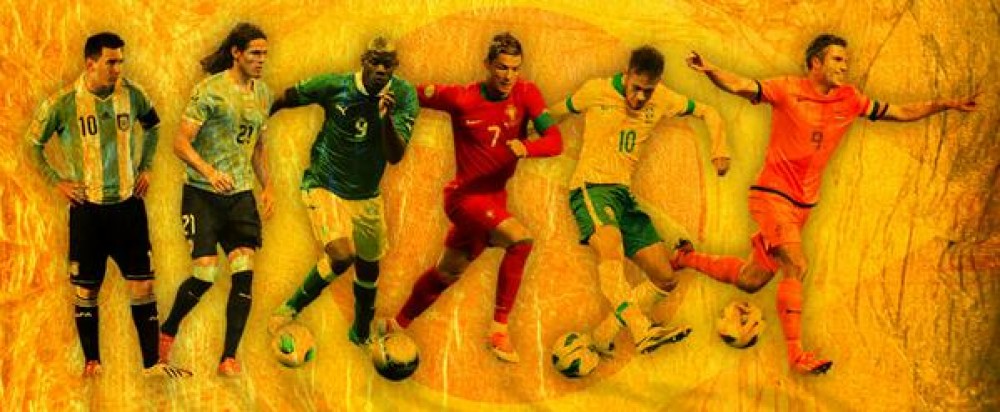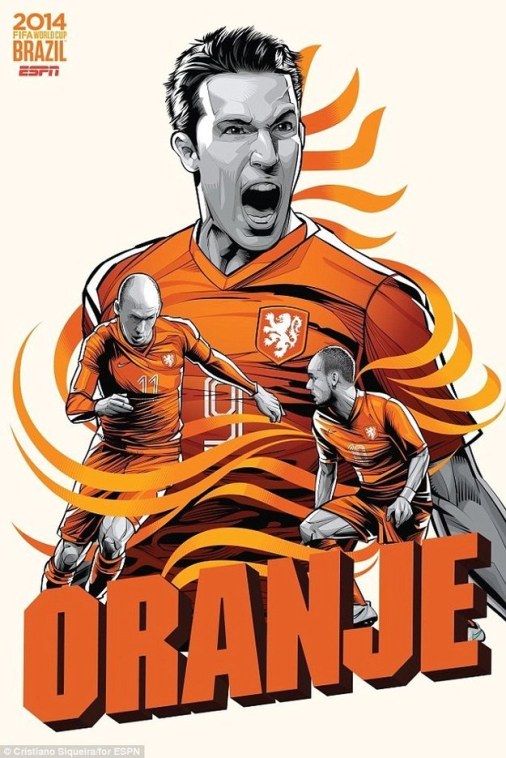The second round has started with a bang and promises to be every bit as thrilling as the group stages. The passion on display in the game between Brazil and Chile was incredible to watch and the tension was palpable as a superb match sprinted towards a penalty shoot out. Usually when a crucial game heads towards the back end of extra time, the two teams become so afraid of losing that the match limps to a standstill with a penalty shootout becoming an inevitable outcome. Brazil and Chile seemed so desperate to avoid a shootout that they ended up trading blows right until the end. Mauricio Pinilla came closest to winning it for Chile as his shot in the last minute of extra time cannoned off the crossbar. The Chileans were left devastated after Julio Cesar’s heroics in the shootout but they have won many admirers for their endeavour in this tournament.
Colombia were a revelation in the group stages with their dazzling brand of football. James Rodriguez and Jackson Martinez have brilliantly stepped up to the plate following the injury to Radamel Falcao. Rodriguez’s two goals against Uruguay have pushed him ahead of Muller, Messi and Neymar as the tournament’s top scorer. Muller and Messi of course have a game in hand but with two assists to his name, Rodriguez is well placed in the race for the golden boot. His first against the Uruguayans was a moment of breathtaking individual quality to rival Robin Van Persie and Tim Cahill’s efforts in the group stages. The second goal was the culmination of move that showed a team working together in beautiful harmony. Juan Cuadrado’s unselfish and athletic header to set up Rodriguez was one of the most sublime assists of the tournament so far. Cuadrado also leads the chart for most assists with four. This Colombian chorus is clearly singing in unison.
On paper, even a Suarez- light Uruguay was Colombia’s toughest assignment in these first four games. The fact that they won so convincingly is a reflection on their quality rather than the impact of the loss of Suarez.
At just 22 years of age- he turns 23 on the eve of the world cup final- James Rodriguez has already had quite a journey in the world of professional football. He spent three seasons at Porto before a £38.5 million transfer to big spending Monaco in 2013 to partner Falcao for both club and country. He has epitomised the style of this young Colombian team and will surely be attracting interest from the giants of European football come the conclusion of this world cup. For all their financial backing, Monaco are not a big player on the European stage and their two Colombian superstars will be courted at every turn. Falcao has already intimated that he would like to leave.
Not since Rivaldo and Ronaldo in 2002 has a player scored in each of the first four games of a tournament. That gives you an indication of what Rodriguez has achieved already. This is also the first time that Colombia have reached the quarter finals. They are up against hosts Brazil however, the highest compliment you can pay to Jose Pekerman’s team is that you would not be at all surprised if they were to triumph on Friday night.
Shortly after their demolition job of world champions Spain in the first round of group matches, I wrote in this blog that I had seen signs that even though they had won convincingly the Netherlands had no chance of winning this tournament. Their second round tie with Mexico looked to be the moment when the cracks in the squad would begin to show. The heat in Fortaleza at an early afternoon kick off local time prompted the first use of the ‘cooling break’ in this tournament wherein the referee can use a stoppage roughly half an hour into each period to allow the players to take on water. Although the cynic in me believed that this would just end up being another opportunity for advertisers to flourish, this actually appears to be a rare moment of sense from FIFA. It was clear that the players were struggling in the conditions and the water would have been an undoubted help.
In the heat, one would have expected that the Mexicans, naturally more acclimatised to such temperatures would have flourished. With Mexico 1-0 up, time running out and Guillermo Ochoa once again performing heroics it looked for all the world as though the Dutch would crack and that the old fissures in the squad would resurface. What transpired was that the Netherlands kept their cool and rallied superby. Louis Van Gaal praised the use of the drinks break after the match but credit should also go to his players who performed admirably and won the game through a late Wesley Sneijder equaliser and a controversial Klaus Jan Huntelaar penalty in stoppage time.
I am still convinced however, that the Dutch will not triumph in this world cup. For all of their attacking strength- they are the top scorers so far with 12 goals- they are far too reliant on Arjen Robben to provide quality and they look increasingly vulnerable at the back. A more clinical team than Mexico would have taken advantage of their winning position.
However, they have not allowed their collective temperament to let them down as has so often been the case in the past. Mexico and the searing heat should have been the moment where my earlier prediction came to pass. The Dutch deserve tremendous credit for enduring the most testing of conditions. How far they go in the tournament remains to be seen however, they and Colombia have provided us all with tremendous entertainment so far.
































